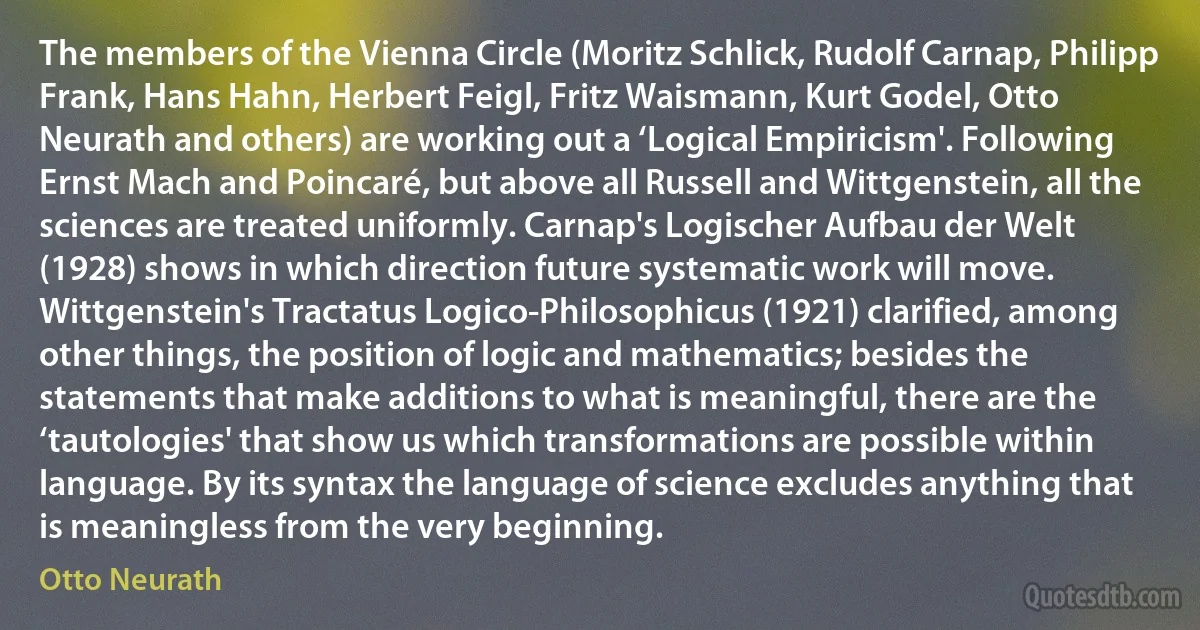Der Quotes
My works are dear to me, each in its own way, I shall have to answer for them on the Day off Judgement. God alone knows whether I shall ever see them again. Quite apart from the money which I was going to receive for their sale there (exhibition in Gallery Der Sturm, Berlin June-July, 1914) and it is no small sum..

Marc Chagall
The greatest threat to a robust, autonomous civil society is the ever-growing Leviathan state and those like Obama who see it as the ultimate expression of the collective. Obama compounds the fallacy by declaring the state to be the font of entrepreneurial success. How so? It created the infrastructure - roads, bridges, schools, Internet - off which we all thrive. Absurd. We don't credit the Swiss postal service with the Special Theory of Relativity because it transmitted Einstein's manuscript to the Annalen der Physik.

Charles Krauthammer
The potato seems like a Romantic (organic) object.... you can watch it growing if you don't eat it. It is going to change – grow, rot, disappear. A pebble is like a Classical thing – it changes little if any... If it was big you could keep the dead down with it.... The Classical idea is not around much anymore. [Der Koning is comparing the Potatoes of Vincent Van Gogh to the Pebbles of Jean Arp.

Willem de Kooning
Through all these researches into an art that would lead to immaterialisation, Werner Ruhnau [German architect] and I came together in the architecture of the air. He was hindered by the last obstacle that even a w:Mies van der Rohe [also a German architect, famous for his reflecting glass skyscrapers in the U. S. ] hadn't been able to overcome: the roof, the screen that separates us from the sky, from the blue sky. And I was hindered by the screen that the tangible blue on the canvas constitutes, which deprives man of a constant vision of the horizon.

Yves Klein
This Spring of 1911 Marianne von Werefkin [his former study-mate in Russia and in fact his life-comapnion for many years, but never married] Andrei, Helene and I went to Prerow on the Baltic [coast]. For me that summer meant a great step forward in my art. I painted my finest landscapes there as well as large figure paintings in powerful, glowing colours and not at all naturalistic or objective. I used a great deal of red, blue, orange, cadmium yellow and chromium-oxide green. My forms were very strongly contoured in Prussian blue, and came with tremendous power from an inner ecstasy. 'Der Buckel', 'Violetter Turban', 'Selbstporträt'.. ..were created in this way. It was a turning-point in my art. It was in these years, up to 1914, just before the war [World War 1.], that I painted my most powerful works, referred to as the pré-war works.

Alexej von Jawlensky
I made my examination in Berlin in 1915. And I must say also that Berlin was for me in another way very important. At the time there were all these new movements – 'Die Brücke'...... the 'Der Blaue Reiter', Walden of the 'Storm' Gallery. Then Kassierer who bought the Chagalls, the first Chagall's that were ever seen in Europe were there. And there was 'Die Brücke'. Rottluff, Heckel, and Kirchner. You know we saw all that. Which was good. You see, Kassierer was then the man who bought the modern French painters. He had particularly Degas who I consider still today a very good painter, one of the best. But, anyway, in spite of my teaching my art was my concern. On the little money I had collected I lived in Berlin very cheaply, ate very cheaply. And already in 1920 I saved the first salaries I received to go to Munich... So for the first time I saw the old masters, Rubens and all at the Alte Pinakothek.

Josef Albers
These days, reporting on the communal in situation in India consists in highlighting the splinter in the Hindu eye and concealing the beam in the Muslim eye. At the time of the 1991 Lok Sabha elections, the German left-leaning weekly Der Spiegel summarized the communal riots in independent India as follows: "Since 1947, Indian statisticians have counted 11,000 riots with 12,000 Muslim victims." Hindu victims are not even mentioned, as if you were reading a fundamentalist paper like Muslim India or Radiance.

Koenraad Elst
Fredo Lampe. Am Rande Der Nacht. For me, name and title evoked those lighted windows from which you cannot tear your gaze. You are convinced that, behind them, somebody whom you have forgotten has been awaiting your return for years, or else that there is no longer anybody there. Only a lamp, left burning in the empty room.

Patrick Modiano
The ideal of strictly scientific method in mathematics which I have tried to realise here, and which perhaps might be named after Euclid I should like to describe in the following way... The novelty of this book does not lie in the content of the theorems but in the development of the proofs and the foundations on which they are based... With this book I accomplish an object which I had in view in my Begriffsschrift of 1879 and which I announced in my Grundlagen der Arithmetik. I am here trying to prove the opinion on the concept of number that I expressed in the book last mentioned.

Gottlob Frege
What stands most explicitly as critique in Nietzsche's late work in not a development from earlier interests but a return to two problems of enduring personal involvement for him, those of Wagner and of Christianity. Der Antichrist, to take one case, is not a response to a resuscitating public interest in Christian religion; it is primarily a renewed attempt to resolve for himself the question of piety.

John Carroll
My publication was for a fine purpose. Certain snobs may now look down on it and call it common or even pornographic, but until the end of the war, I had Hitler's greatest respect, and Der Stürmer had the party's complete support. At our height, we had a circulation of 1.5 million. Everybody read Der Stürmer, and they must have liked it or they wouldn't have bought it. The aim of Der Stürmer was to unite Germans and to awaken them against Jewish influence which might ruin our noble culture.

Julius Streicher
In men of genius, sterile years precede productive years, these again to be followed by sterility, the barren periods being marked by psychological self-depreciation, by the feeling that they are less than other men; times in which the remembrance of the creative periods is a torment, and when they envy those who go about undisturbed by such penalties. Just as his moments of ecstasy are more poignant, so are the periods of depression of a man of genius more intense than those of other men [Wie seine Ekstasen gewaltiger sind als die der anderen, so sind auch seine Depressionen fürchterlicher]. Every great man has such periods, of longer or shorter duration, times in which he loses self-confidence, ... times in which, indeed, he may be sowing the seeds of a future harvest, but which are devoid of the stimulus to production.

Otto Weininger
Recently I dreamed of you [of the artist Herman van der Weele and his wife] and that you two were very rich and lived in a beautiful place and that I sat in your room with you and Herman, with beautiful fabrics and wallpapers that I couldn't stop looking to them and you wore black glasses, just like me now [to protect his eyes], but they [black glasses] were so amazingly beautiful and they suited you so well, as is only possible in a dream, and your dress was beautifully deep red blue black with exotic figures woven into it and the walls were yellow and pink. Anyway it was all a miracle of beauty and I wished that.... my eyes were healthy again and that we each could spent hundred thousand guilders a week, then we had built a beautiful yacht and we all sailed to the country of the Mikado [Japan], to have a look there.

George Hendrik Breitner

![[referring to his painting 'Everyone Stands under His Own Dome of Heaven' (1971): It is a man in his own universe. It [the painting] was a quotation of, taken out of Robert Musil's novel 'Der Mann ohne Eigenschaften'; how do you translate it in English? 'The Man without qualities', I think – the most important book of the 20th century I would say. So this is a quotation: Jeder Mensch soll nach seine Himmel gucken.. .. I meant there is no objective truth. So as I discovered later, there is no objective history. There is no history; each human being made its own history – has his own thoughts and his own world. And sometimes two domes touch each other, or cross each other, but everyone is alone with its own illusions and methods.. (Anselm Kiefer)](https://cdn.quotesdtb.com/img/quotes_images_webp/45/anselm-kiefer-book-century-426745.webp)

